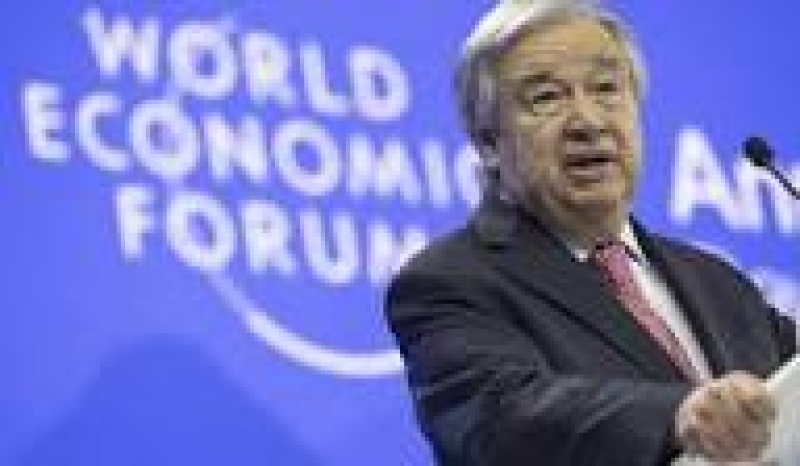- Trump considering military options on Greenland; Europe rejects |
- Fertiliser crunch threatens Kushtia’s onion boom despite high prices |
- Security Council Divided on United States' Venezuela Action |
- Over 1.53m voters register for postal balloting: Shafiqul Alam |
Climate, AI, Tariffs, and Global Leadership Dominate at WEF

At the World Economic Forum in Davos, U.N. Secretary-General António Guterres delivered a stark warning on climate change, calling humanity’s fossil fuel dependency a “Frankenstein monster” that spares no one. His remarks echoed his growing concern about the ungoverned rise of artificial intelligence (AI), which, he said, could bring profound risks if left unchecked. While Guterres sounded alarms, others highlighted the promise AI holds, especially for global economies.
The Davos meeting buzzed with discussions surrounding shifts in U.S. leadership following President Donald Trump’s return to office, with many government officials, business executives, and academics reflecting on the future of trade, tariffs, and economic cooperation.
Ukraine's President Volodymyr Zelenskyy was also in Davos, meeting with global leaders—including Israeli President Isaac Herzog and German opposition leader Friedrich Merz—seeking further support in Ukraine’s ongoing fight against Russian aggression.
Here’s a look at some key moments from Wednesday’s session:
Guterres Doubles Down on Climate Change Warning
With energy and technology leaders in attendance, Guterres renewed his call for accelerated action to combat climate change. He lamented that 2024 was the hottest year on record and warned that rising sea levels could soon overwhelm ports crucial for oil trade. "Our addiction to fossil fuels is a Frankenstein monster," he said. "It spares nothing and no one." He criticized companies that have recently reversed their climate pledges, stressing that such actions place them "on the wrong side of history."
The Promise and Perils of Artificial Intelligence
While AI was praised for its potential to revolutionize industries—from health care to agriculture—Guterres warned that without proper governance, it could be used for harmful purposes, from spreading misinformation to disrupting labor markets. "AI must not be a tool of deception or manipulation," he cautioned, noting that its impact on warfare also poses significant risks.
Amid these concerns, U.S. officials unveiled a new venture aimed at building out the infrastructure for AI’s future, including a massive $500 billion project in Texas, a collaboration between Oracle, SoftBank, and OpenAI. Julie Sweet, CEO of Accenture, praised the initiative as a "validation" of AI's importance, but emphasized the need for trust and regulation in its development. "AI will not be successful if people don't trust it," she said.
Malaysia's Vision for AI Integration
Malaysian Prime Minister Anwar Ibrahim also weighed in on AI, acknowledging the challenges his country faces in adapting to the rapidly changing technology. "We don’t have the expertise or know-how," he admitted, but expressed determination to accelerate AI adoption. His comments came as Malaysia and Singapore unveiled a new economic zone designed to boost job creation and attract investment, with AI playing a central role.
Sánchez Pushes for EU Regulation of Social Media
Spanish Prime Minister Pedro Sánchez called for stronger European Union regulation of social media platforms, which he criticized for fostering division and misinformation. "These tech billionaires want to overthrow democracy," Sánchez said, citing the dangers of social media spreading anti-liberal ideologies. He proposed policies to remove user anonymity, open up the “black box” of social media algorithms, and hold platform owners accountable for the harm their sites cause.
UK Hopes to Avoid Trump’s Tariffs
The ongoing debate over U.S. tariffs was a central topic in Davos, with attention on President Trump's threat to impose tariffs on countries with large trade surpluses with the U.S. Britain, which maintains a small trade deficit with the U.S., expressed hope that it would be spared from such measures. UK Treasury Chief Rachel Reeves highlighted the deep economic ties between the two nations, noting that millions of people in both countries are employed by businesses across the Atlantic. "Tariffs between the U.S. and the UK would not be in either of our interests," she said.
The World Economic Forum continues to serve as a critical stage for world leaders to discuss these pressing global challenges and work toward solutions that balance economic growth, environmental sustainability, and technological progress.

